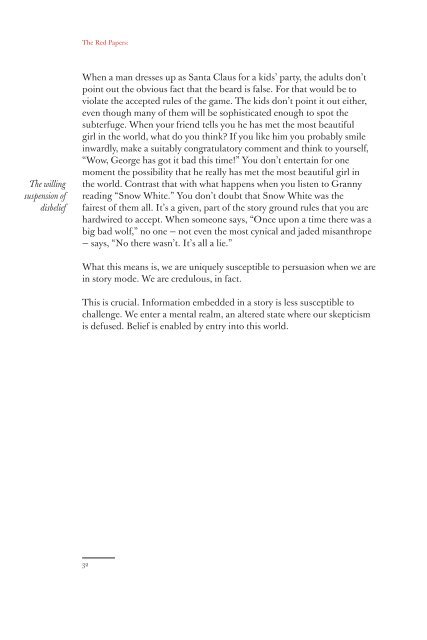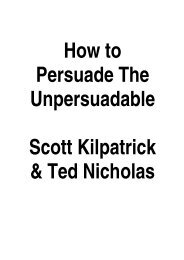1rZwMNa
1rZwMNa
1rZwMNa
You also want an ePaper? Increase the reach of your titles
YUMPU automatically turns print PDFs into web optimized ePapers that Google loves.
The Red Papers:<br />
The willing<br />
suspension of<br />
disbelief<br />
When a man dresses up as Santa Claus for a kids’ party, the adults don’t<br />
point out the obvious fact that the beard is false. For that would be to<br />
violate the accepted rules of the game. The kids don’t point it out either,<br />
even though many of them will be sophisticated enough to spot the<br />
subterfuge. When your friend tells you he has met the most beautiful<br />
girl in the world, what do you think? If you like him you probably smile<br />
inwardly, make a suitably congratulatory comment and think to yourself,<br />
“Wow, George has got it bad this time!” You don’t entertain for one<br />
moment the possibility that he really has met the most beautiful girl in<br />
the world. Contrast that with what happens when you listen to Granny<br />
reading “Snow White.” You don’t doubt that Snow White was the<br />
fairest of them all. It’s a given, part of the story ground rules that you are<br />
hardwired to accept. When someone says, “Once upon a time there was a<br />
big bad wolf,” no one — not even the most cynical and jaded misanthrope<br />
— says, “No there wasn’t. It’s all a lie.”<br />
What this means is, we are uniquely susceptible to persuasion when we are<br />
in story mode. We are credulous, in fact.<br />
This is crucial. Information embedded in a story is less susceptible to<br />
challenge. We enter a mental realm, an altered state where our skepticism<br />
is defused. Belief is enabled by entry into this world.






